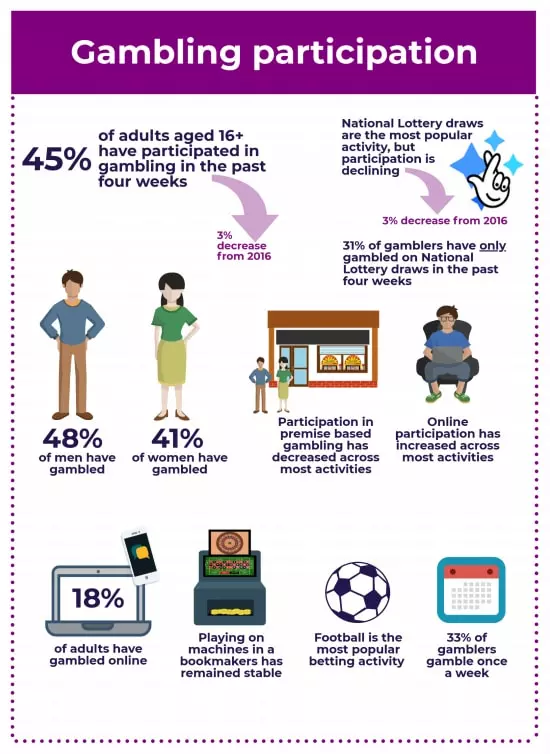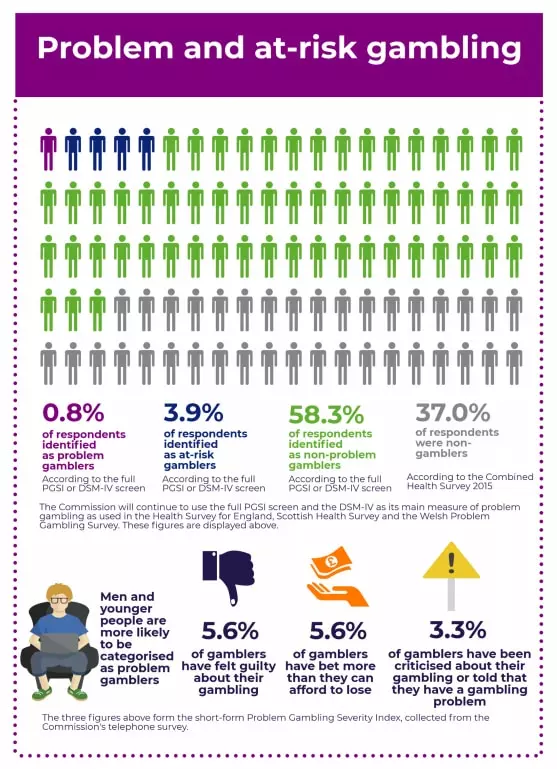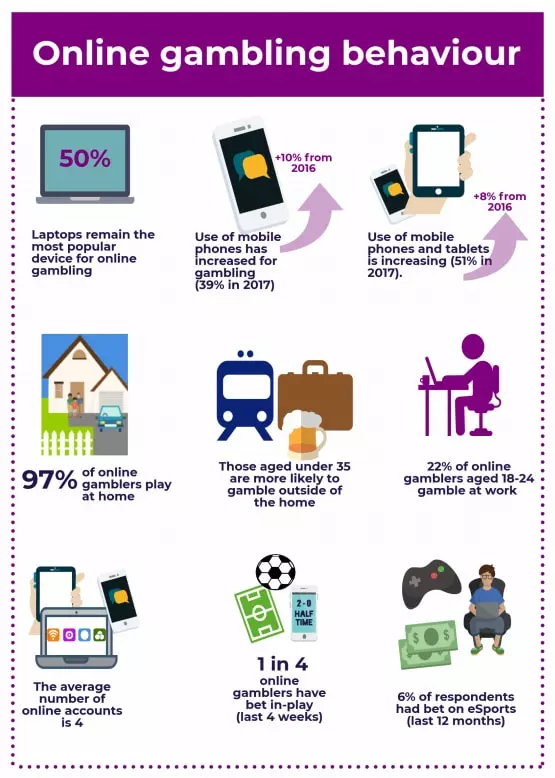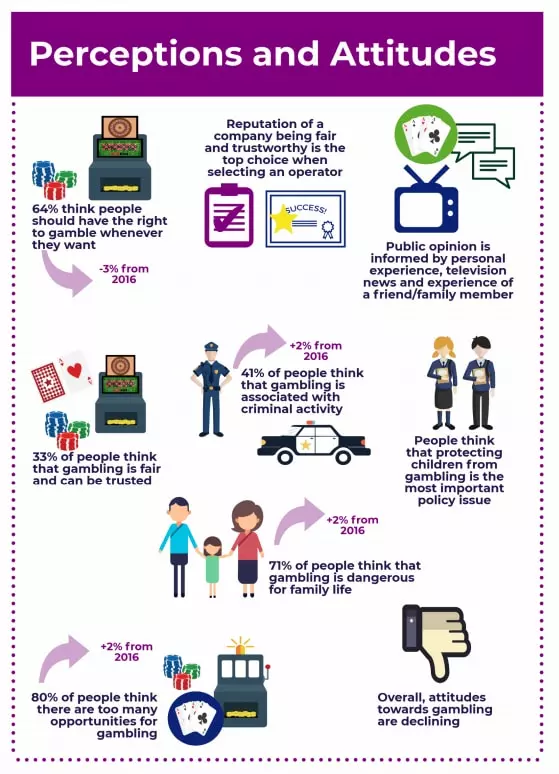 The UK Gambling Commission (UKGC) published its latest report on gambling participation and perceptions for 2017, unveiling the latest trends among local gambling customers. The newly-published report brings more light on customer participation rates, attitudes towards gambling services, online gambling behaviour, problem gambling behaviour and customer awareness of gambling management tools.
The UK Gambling Commission (UKGC) published its latest report on gambling participation and perceptions for 2017, unveiling the latest trends among local gambling customers. The newly-published report brings more light on customer participation rates, attitudes towards gambling services, online gambling behaviour, problem gambling behaviour and customer awareness of gambling management tools.
The Programme Director of the UK gambling regulatory body, Ben Haden, commented on the recently reported results, saying that the new 3-year strategy of the UKGC set out the Commission’s role in improving the understanding of the impact that society suffered from gambling. As he explained, the report showed that the key factor that had influence on people gambling, was the fairness and trustworthiness demonstrated by a certain operator.
Gambling Participation
 As mentioned above, the UK Gambling Commission provided thorough data concerning the players’ gambling participation over 2017. The regulatory body revealed that a total of 45% of the adults aged over 16 participated in at least one gambling activity over the previous four weeks. This figure represents a 3% decline of the gambling participation rates of local customers in comparison to the 2016 result, but is still in line with the rates reported back in 2015.
As mentioned above, the UK Gambling Commission provided thorough data concerning the players’ gambling participation over 2017. The regulatory body revealed that a total of 45% of the adults aged over 16 participated in at least one gambling activity over the previous four weeks. This figure represents a 3% decline of the gambling participation rates of local customers in comparison to the 2016 result, but is still in line with the rates reported back in 2015.
According to the UK Gambling Commission report, more men have taken part in any form of gambling than women. The percentage rates were 48% for men compared to 41% for women who participated in gambling activities offered on the territory of the UK. As far as age groups are concerned, the gambling regulator revealed that individuals in the age groups from 25 to 34 and from 45 to 64 were more likely to gamble. The most recent statistics showed that gambling participation of the age group of people from 35 to 44 years old declined to 43% in 2017. In comparison, the percentage rate registered a year earlier amounted to 49%.
Most Preferred Forms of Gambling
The gambling regulatory authority of the UK also provided some details about the types of gambling activities which were most preferred by British customers in 2017. According to the Commission’s report, the National Lottery was the most popular gambling activity in 2017, with 27% of players taking part in its draws. Scratch cards and other lotteries followed, with both of them being preferred by 11% of local customers. Still, the participation rate in the National Lottery draws marked a decrease, following the Lotto ticket price increase to £2 and the larger number of lotto balls introduced in October 2015.
Customers’ participation in fruit and slot machines was reduced to 4%, with slots machines being most popular in pubs and arcades. Participation in sports betting also marked a slight decline to 6%. Controversial fixed-odds betting terminals (FOBTs) offered by bookmakers kept stable rates of participation amounting to 1%.
Gambling Participation Motives
The UKGC also paid attention to the gambling participation motives of local customers, in order to provide answer to the question “Why people gamble?”
A survey which was carried out under the gambling regulator showed that an estimate of 46% of the people who gambled said their participation in such activities was provoked by their desire to win in general. Then, 34% of the survey respondents revealed they gambled for fun and enjoyment, followed by 19% who wanted to win a jackpot.
The ones who wanted to make contribution to good causes amounted to 18%. A total of 10% of the survey participants said they gambled as a hobby, while 9% of the people interviewed said they used gambling activities as a way to socialise with other people. Earning money to get by day-to-day was the motive of 8% of the respondents, while the 7% left had other reasons to participate in any form of gambling.
In addition, the UK Gambling Commission revealed that National Lottery players are much more likely to gamble in general than to place bets only for fun. In contrast, players who preferred betting on bookmakers’ fixed-odds betting terminals are much more likely to play for fun than to actually generate profit.
Forms and Frequency of Gambling
The survey respondents were also asked to reveal whether their preferences go to in-person gambling, online gambling, or both. According to the information provided by the UKGC, 80% of the players who gambled over the previous four weeks made that in person. On the other hand, 42% of the survey respondents revealed they have gambled by using the Internet.
In-person participation for a number of activities including the National Lottery draws fell by 3% in comparison to 2016, reaching 76%. Other lotteries suffered a 4% decline to 59% in in-person participation, and so did casino games with their in-person participation rate reaching 58%.
As far as the frequency of gambling is concerned, the highest frequency rates of any individual activity registered in the previous four weeks was most commonly once a week in about 33% of the cases. In addition, approximately 21% of the survey respondents gambled on any individual activity at least twice a week, while 17% of the players participated in any gambling activity less than once a month.

Image credit: UK Gambling Commission
Problem and At-Risk Gambling
 Problem gambling has become one of the hottest topics in the UK gambling industry, as various gambling regulators and charity organisations have warned about the increasing rates of gambling addictions among local residents. The UK Gambling Commission has been engaged with tracking problem gambling data by using various methods.
Problem gambling has become one of the hottest topics in the UK gambling industry, as various gambling regulators and charity organisations have warned about the increasing rates of gambling addictions among local residents. The UK Gambling Commission has been engaged with tracking problem gambling data by using various methods.
As revealed by the official Health Survey conducted by the UKGC, a total of 0.8% of the respondents were considered problem gamblers. According to the data revealed, men are more likely to be affected by gambling addictions, with 1.5% of men described as problem gamblers in comparison to only 0.2% of women. When it come to the age groups which are most likely to suffer gambling-related harm, it was the group of people aged from 25 to 34 that is most likely to be identified as problem gamblers, followed by the ones aged from 16 to 24.
As far as people who are put at risk of becoming problem gamblers are concerned, the Commission’s Health Survey revealed that 3.9% of local adults are put at risk of falling under the harmful influence of gambling addiction. Once again, men are more likely to be identified as at-risk gamblers, with 6.0% of men classified as such, in comparison to 1.9% of women. The groups of people aged from 16 to 24 and from 25 to 34 were describes as the ones most likely to be put at risk of becoming problem gamblers.

Image credit: UK Gambling Commission
Online Gambling Behaviour
 The UK gambling regulatory body paid special attention to online gambling behaviour in the 52 weeks ending on December 31st 2017. The Commission used data collected via a quarterly online survey which was carried out by Populus.
The UK gambling regulatory body paid special attention to online gambling behaviour in the 52 weeks ending on December 31st 2017. The Commission used data collected via a quarterly online survey which was carried out by Populus.
Devices Used for Online Gambling
According to the data provided by the survey, laptops remain as the most popular devices used for online gambling in 2017, despite a steady decline marked in the last few years. Approximately 50% of the survey respondents shared they use their laptops in order to access online gambling websites.
Mobile phones were the second most-preferred type of devices used for online gambling, with 39% of the people saying they used their smartphones to gamble. This figure saw a 10% increase in comparison to the ones in 2016. Personal computers were used by about 33% of the survey participants.
Preferred Location for Online Gambling
Considering the fact that mobile devices, including laptops, smartphones and tablets, have become more and more popular among UK residents to gamble, the trends in customer preferences for online gambling location were also studied.
Gambling at home remained the most popular location for online gambling, with a the majority of people (97%) saying that they preferred placing their bets at the comfort of their homes. Men were more likely to gamble outside of their home compared to women, including when being at work, in a pub, or at various venues.
In-Play Betting
Live betting, which is also known under the term in-play betting, have become increasingly popular among UK gamblers. This form of betting is especially popular among customers who prefer betting on sporting events and seems to be predominantly an online activity.
Approximately 26% of online gamblers revealed that they had used live betting options to gamble over the last four weeks – a trend which has been relatively stable over the past few years. In-play betting participation saw the largest increase within the 55-65 age group where live betting rates rose by 14%.
eSports
Over the past few years electronic sports, also known as eSports, have been enjoying an increase in their popularity both as an entertainment and betting activity.
According to the results revealed by the UKGC report, a total of 7% of the respondents to the Commission’s survey revealed that they had ever place a bet on electronic sports. Almost all of them (6%) shared they did that over the past 12 months. Last year, it was the group of customers aged between 25 and 34 who had been most active in placing bets on eSports. The participation rates for eSports were the lowest for the people aged 65 and older.

Image credit: UK Gambling Commission
Attitudes and Perception of Gambling
 The UK gambling regulatory authority has been tracking the public perceptions of gambling for about a decade now. The Commission is also set to check the specific public attitudes and opinions towards gambling activities.
The UK gambling regulatory authority has been tracking the public perceptions of gambling for about a decade now. The Commission is also set to check the specific public attitudes and opinions towards gambling activities.
According to the information presented in the latest report of the UKGC, despite the fact that gambling has become a preferred pastime for many individuals, it seems that attitudes towards gambling are suffering a decline, with more people sharing some concerns with gambling services offered in the country.
Reportedly, 64% of UK residents think people should be given the right to gamble whenever they would like to. Still, the figure represents a 3% decline in comparison to 2016. Also, 33% of the survey respondents have said that gambling is fair, so it can be trusted. However, 80% of people who responded in the Commission’s survey believe there are currently too many forms of gambling offered in the market, with their number increasing by 2% in comparison to the 2016 figures.
As mentioned above, the report’s results showed that gambling companies’ reputation has been among the major factors when people make a choice which operator to bet with, with fairness and transparency pointed as the most important factors.
In 2017 there was also a 2% increase in the number of people who believe that gambling is associated with criminal activity (41%). It also turned out that the majority of UK residents who took part in the UKGC survey think gambling poses a danger to family life.

Image credit: UK Gambling Commission
- Author


